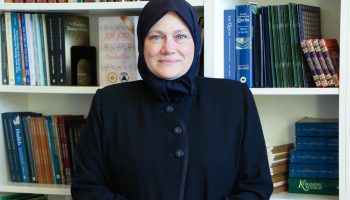Kaitlyn Finchler
Contributing Writer

Whenever there are conversations about the definition of a good life or opinions on politics and policy, religion is at the intersection.
David Campbell, the Packey J. Dee Professor of American Democracy at Notre Dame University and director of the Notre Dame Democracy Initiative, and Alan Cooperman, director of religion research at Pew Research Center, will give their lecture “Causes and Consequences of the Major Trends in American Religion” at 2 p.m. today in the Hall of Philosophy to close the Week Four Interfaith Lecture Series theme, “Who Believes What, and Why That Matters — in association with Pew Research Center.”
“Alan and I will discuss some significant trends in the American religious landscape over the last few years,” Campbell said. “We’ll talk about some recent developments that the Pew Research Center has found. It’s been an interesting discovery that we’ve seen the steady increase in the percentage of people who have no religious affiliation. Over 20 to 25 years, that appears to have stopped or at least slowed down considerably.”
Campbell said he and Cooperman will discuss why this is the case and what it means for the future of American religion.
“The fact of the matter is that in the United States, religion, just as a broad category, plays a very important role in civil society,” Campbell said. “We can’t really understand what’s going on in American culture or American politics, or just American society writ large, without understanding religion.”
The American religious landscape is always changing, Campbell said, which makes it a “moving target” and “fun” to study.
“I hope, from the whole week, that people will take away a better understanding of what are the long-term and short-term religious trends,” Cooperman said. “I think there is some confusion about that. I don’t mean to say that we can settle everything as a matter of clear fact — there are areas of interpretation, areas of uncertainty — but I think we can clarify some of the basic facts about what is going on.”
At Pew Research Center, Cooperman said he and his colleagues bring this information in though a “data-driven lens.” The data showing a plateau of people who don’t identify as religious raises a lot of questions, Cooperman said.
“We don’t see any evidence of a revival, and I think that’s a really important point to make,” Cooperman said. “I wouldn’t say that it’s certainly not impossible that a revival could take place, but we’re not prognosticating the revival because we don’t see any evidence of that.”
Campbell said there’s an “important division” between people who “simply aren’t religious” and those who identify as atheist or agnostic.
“These two groups of people, those who just aren’t religious versus those who are secular, are very different from one another,” Campbell said. “They’re very different politically, (and) they’re very different civically, so understanding that there are two groups of nonreligious people, I think, sheds a lot of light on what’s happening in the United States today.”
In Campbell’s research, he said one of the “primary drivers” pushing people away from religion has been a negative reaction, or “allergy,” to the “religious right.”
“For many Americans, when they think religion, they actually think the Republican Party,” Campbell said. “Or at least, they think of conservative politics, and if that’s not their politics, then they don’t want anything to do with religion.”
While this is not the only reason driving people away from religion, Campbell said in his research, it is the leading reason.
“We approach all this, really, in a spirit of curiosity and impartiality,” Cooperman said. “I think the Chautauqua audience is an audience of a lot of people with a lot of different, no doubt, religious points and backgrounds, but who all recognize that religion is important individually and collectively. It has been throughout American history and is so today, so let’s talk about it.”




